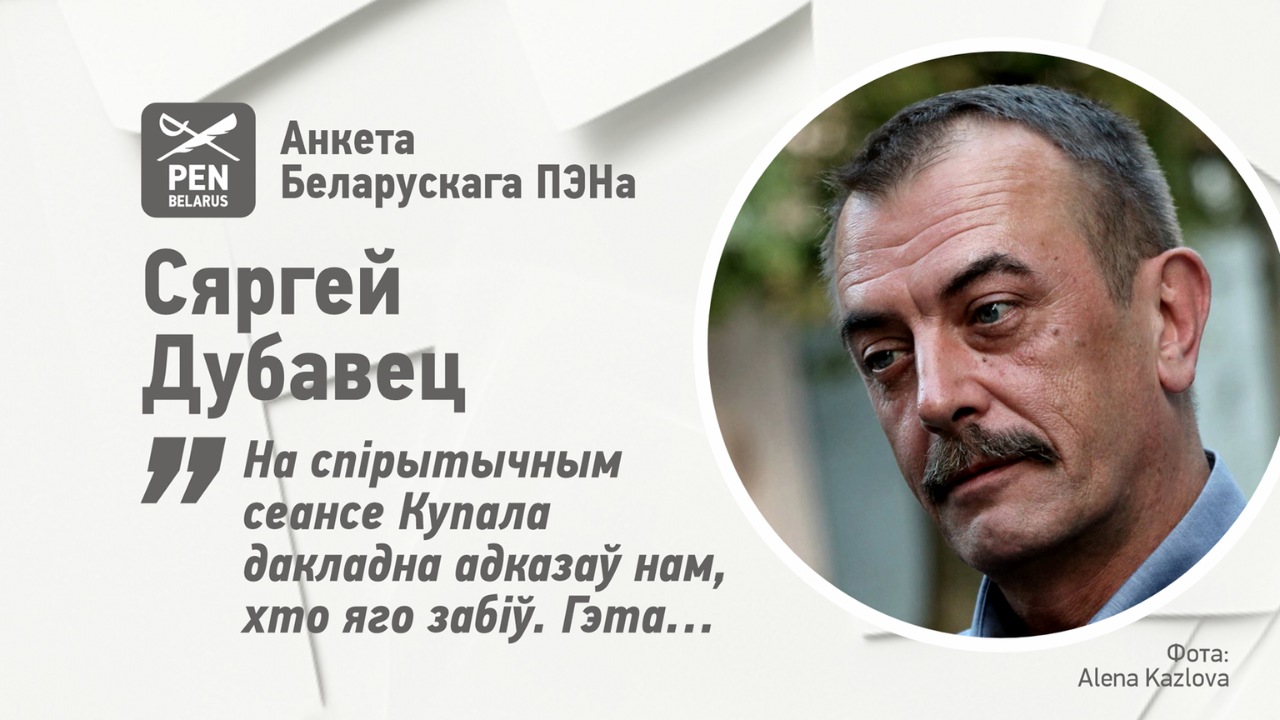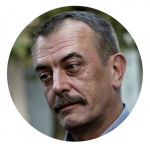
Belarusian PEN Questionnaire
What do writers think about certain facets of the creative process, the new challenges facing masters of the word, their literary taboos and sins, dreams and temptations? The answers to this questionnaire are not only mini-portraits of remarkable creators but also a kind of mirror reflecting the spirit of our organization.
1. Creation
What devil drives you to sit down at your writing desk? Do you keep any amulet or totem on it? Do you have a starting ritual?
Sometimes words beg to be written down unbearably—no matter where, when, or onto what—most often now into the phone. Ideally, it is a title that in itself contains the entire work in condensed form. Then all that remains is to find the time to sit at the computer and begin to unravel it. The more precise the title, the more joyfully you decode it, as if it all happens on its own. For me, this is the ritual: nothing extra, nothing that might distract.
What is the nature of your creative impulse, your illumination? Do you rely more on notebooks—or memory, life’s conflicts?
I never look for the impulse—it seems it is the impulse that finds me. In the process, of course, you need notebooks, conflicts, and quotations. Especially interesting are quotations—you can spend an entire day trying to trace back: where did I read this?
If your dreams had a textual version, what would this work be about, and what would it be like?
In my view, in dreams a person goes out into the open space of the collective unconscious—that is, joins a single vast common mind. If it were otherwise, dream books (which claim to be universal) wouldn’t be so popular. So I cannot call a dream creativity—at least not my private creativity.
Which book from world (or Belarusian) literature would you close forever so no one could ever read it again?
That seems like the task of a censor. I am more interested in opening books—and in having them read as widely as possible.
What is your greatest writer’s sin? What literary taboo have you broken or dream of breaking?
Harmony is like the holy spirit of a text that sanctifies it. Where there is harmony, there can be no sin or taboo. If they are present, it means the text does not contain harmony. In other words, every writer, in my opinion, has the opposite aspiration.
2. Creators
Who has influenced your literary style the most? Whose example do you measure yourself against? Whose impulses do you hear most clearly?
Tonino Guerra left a powerful impression on me. Forty years ago, I could say to myself: this is exactly mine, this is how I want to write. I was enchanted by the art of thinking on paper in Albert Camus: once you begin, you never know what discoveries await—paper has its own logic and its own world. In terms of identity and general attitude, I would most like to see myself as a Belarusian writer in the same line with Filon Kmita-Chernobylsky.
Do you ever ask anyone to read your text before you hand in the manuscript?
When it comes to a book, each one is read and discussed at least with the editor. I deliberately tried to “hand out” my last two books for reading. This was useful not so much for those books as for my own understanding of myself and what I do. It felt as if they helped me “complete” myself. And for now, I feel that this “added value” is enough for my next texts.
If you were offered a spiritual séance with the ghost of a writer, who would it be, and what would you like to learn from them?
I actually had such séances in my student days. As students, we dabbled a bit in spiritism—by all the rules: a big sheet of paper with the alphabet written in a circle, a saucer gliding over the letters to form words, fingertips quickly lifting off the saucer as it moved by itself, sensing the energy of our souls… The very first séance puzzled me for life. We spoke with Janka Kupala, asking: who killed you? The answer was absolutely specific: Mirol’d Kaminsky. This figure has remained a mystery, but it was named. Later séances were less memorable and ended with us summoning “the spirit of the grey mare.” That is, we were simply tired of it. It seemed that the name of Kupala’s killer was our bingo—and nothing bigger could be found.
Your top list of writers—members of Belarusian PEN?
In my opinion, in PEN—as an organization that has preserved its horizontal structure and thus affirmed the equality of its members—it’s inappropriate to make a ranking based on personal qualities and achievements. PEN is like a pot of soup where everyone—carrots, onions, potatoes—boils equally. No one is more important than the others. Anyone can impress; there is respect for what has been done, and the greatest thing is the anticipation.
Whom and what have you read lately?
One way or another, I’ve read and will keep reading everything that has been published and is being published. It’s a rather chaotic process, and if I were to list it, I could hardly call it a recommended reading list. Still, I see a lot of important things in literature today. I am impressed by translations of foreign literature. Literary criticism is slowly reviving. Strong breakthroughs into the international literary space by Alherd Baharevich, Eva Vezhnovets, and others. In my opinion, these are precious seedlings—and all of us should watch them and help them grow.
3. Creativity
What is the strangest place where inspiration has ever come to you?
For me, inspiration itself is the marvel, and it comes to every place—whose strangeness immediately ceases to matter.
What do you consider the greatest literary myth?
Probably the idea that literature can change the world. It can certainly influence people, “nurture” children—like Janka Maur, Mark Twain, or Jack London. And these children—many of them—will go on to change the world. But as for literature itself directly changing the world—like Orwell—no matter how much we might wish it, it cannot. All the vices authors have exposed, ridiculed, and seemingly eradicated to the root reappear again.
Which sacred book of Belarusian literature are you tempted to rewrite the ending of?
Sacred books have sacred endings. That is, they are no longer literary fact or material, but something greater and something else entirely. It is precisely the sacredness that we will never rewrite.
What question would you like to hear from readers but haven’t yet?
What is the very first thing the new Belarusian government must do? I think it must introduce criminal liability for denying the Belarusian nation. We need to move from this endless denial and proving of ourselves as a subject to a new, sovereign quality—a normal nation, equal among others.
Do you believe that words can change the Belarusian world?
I have believed it from the start. It is the Belarusian world, which arose in literature, that must in reality live up to what is in books. But that is already politics.

Siarhiej Dubaviec is a Belarusian writer and journalist.
He was the editor of the criticism section of the magazine Neman, editor-in-chief of the newspapers Nasha Niva and Svaboda, and of the radio station Baltic Waves. He is the author of broadcasts and columns on Radio Free Europe/Radio Liberty.
Dubavets is the author of several books and has been awarded Lithuania’s “For Courage” Medal, as well as the Jerzy Giedroyc Prize, the Ales Adamovich Prize, the Hlinyany Viales Award, and the Golden Apostrophe.
